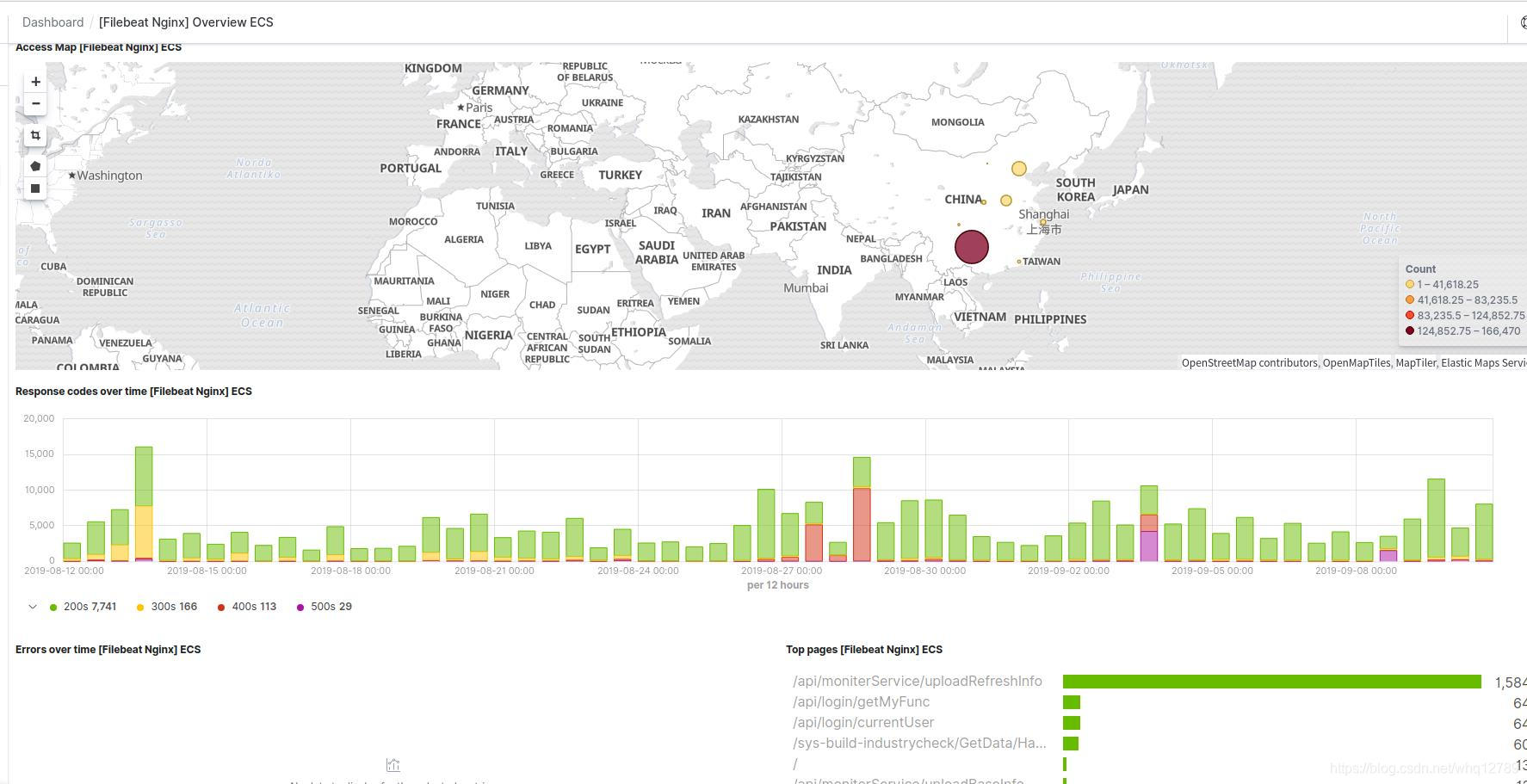目录
1.简介
2.下载
3.直接输出到ElasticSearch
4.输出到Logstash
5.更改nginx日志路径
6.logstash负载均衡
7.日志文件直接作为输入
1.简介
FileBeat用于文件数据采集并输出到ElasticSearch或Logstash中。
ELK搭建过程参见: ELK搭建及Java程序接入
2.下载
下载FileBeats OSS 7.2.1版本
https://artifacts.elastic.co/downloads/beats/filebeat/filebeat-oss-7.2.1-linux-x86_64.tar.gz
tar xzvf filebeat-oss-7.2.1-linux-x86_64.tar.gz
cd filebeat-7.2.1-*
#启用nginx模块
./filebeat modules enable nginx
3.直接输出到ElasticSearch
#设置初始环境
./filebeat setup -e
此时报错连接不上kibana
instance/beat.go:877 Exiting: error connecting to Kibana: fail to get the Kibana version: HTTP GET request to http://localhost:5601/api/status fails: fail to execute the HTTP GET request: Get http://localhost:5601/api/status: dial tcp [::1]:5601: connect: connection refused. Response: .
Exiting: error connecting to Kibana: fail to get the Kibana version: HTTP GET request to http://localhost:5601/api/status fails: fail to execute the HTTP GET request: Get http://localhost:5601/api/status: dial tcp [::1]:5601: connect: connection refused. Response: .
修改连接kibana的配置
vi filebeat.yml
setup.kibana:
host: "192.168.81.145:5601"
重新设置初始环境
#运行filebeat
./filebeat -e
#附:静默运行
nohup ./filebeat -e > service.out&
此时
kibana中就有了filebeat-*索引,可以看到日志数据
多跑一些数据,打开kibana的Dashboard,选择filebeat给创建的[Filebeat Nginx] Overview ECS,可以看到如下页面,地图展示、柱状图饼图统计等均有。

4.输出到Logstash
vi filebeat.yml
output.logstash:
hosts: ["localhost:5044"]
把以下两个配置节注释掉
setup.kibana:
output.elasticsearch:
重启filebeat后,nginx访问日志会写入到logstash中,但此时logstash写入elasticsearch会报错:failed to parse field [host] of type [text] in document with id 'E0lsjW4BTdp_eLcgfhbu'
看elasticsearch日志发现此时host为一个json对象,需要变为字符串才行
修改配置,添加过滤器,把host.name赋值为host
vi config/logstash.conf
filter {
mutate {
rename => { "[host][name]" => "host" }
}
}
重启后即可
5.更改nginx日志路径
vi modules.d/nginx.yml
- module: nginx
access:
enabled: true
var.paths: ["/path/to/log/nginx/access.log*"]
error:
enabled: true
var.paths: ["/path/to/log/nginx/error.log*"]
6.logstash负载均衡
注意要加loadbalance: true
output.logstash:
hosts: ["localhost:5044", "localhost:5045"]
loadbalance: true
7.日志文件直接作为输入
vi filebeat.yml
- type: log
enabled: true
paths:
- /root/*.log
在/root/目录下新建1.log、2.log随便写几行日志,filebeat重启后即可入到elasticsearch中。
启动后再增加3.log或往已有的1.log中加日志均可入到elasticsearch中。

部署 系统CPU内存等资源情况监控)







)






![[原创] 毕设---在myeclipes中安装Hadoop开发插件](http://pic.xiahunao.cn/[原创] 毕设---在myeclipes中安装Hadoop开发插件)

![[转]cubemap soft shadow](http://pic.xiahunao.cn/[转]cubemap soft shadow)
